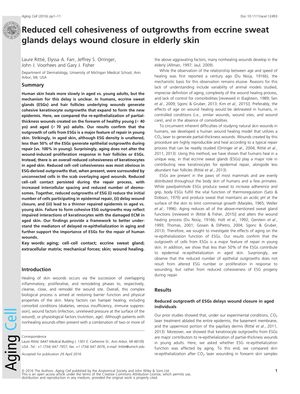Reduced Cell Cohesiveness of Outgrowths from Eccrine Sweat Glands Delays Wound Closure in Elderly Skin
May 2016
in “
Aging Cell
”

TLDR Older people's sweat glands are less effective at helping skin wounds heal due to weaker cell connections.
The study examined the delayed wound healing in elderly skin, specifically the role of eccrine sweat glands (ESGs) in the process. It compared wound healing in young adults (under 40) and aged adults (over 70), finding that ESG density did not change with age, but the ability of these glands to produce epithelial outgrowths during repair was significantly reduced in aged skin. In young skin, 100% of ESGs produced outgrowths, while less than 50% did so in aged skin. This was not due to a difference in cell proliferation but was linked to reduced cell-cell cohesiveness in aged keratinocytes. Consequently, fewer cells contributed to repair, leading to delayed wound closure and a thinner repaired epidermis in elderly individuals. The study, with sample sizes of 5 and 6 for different measurements, concluded that impaired interactions between keratinocytes and the extracellular matrix in aged skin might explain the failure to form cohesive ESG outgrowths and the observed delay in re-epithelialization with aging.

